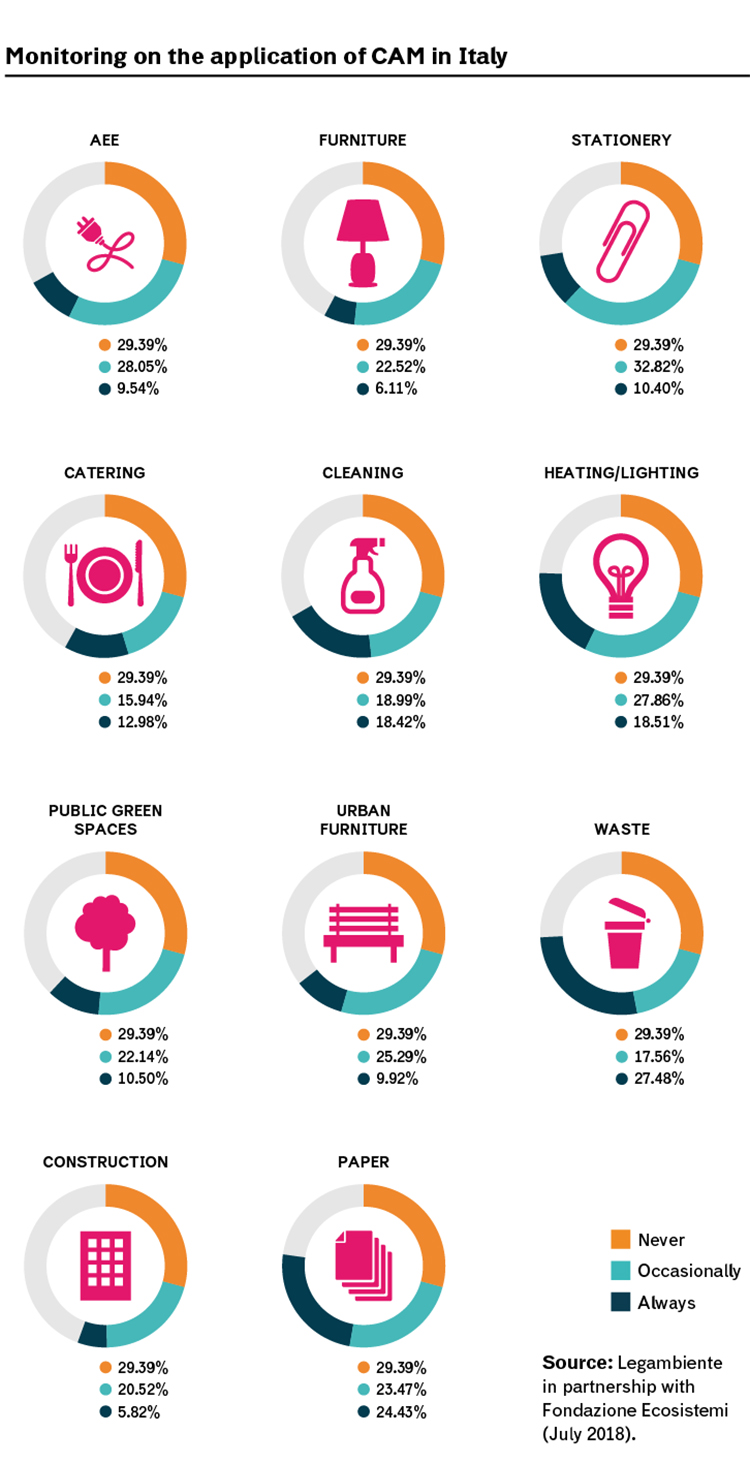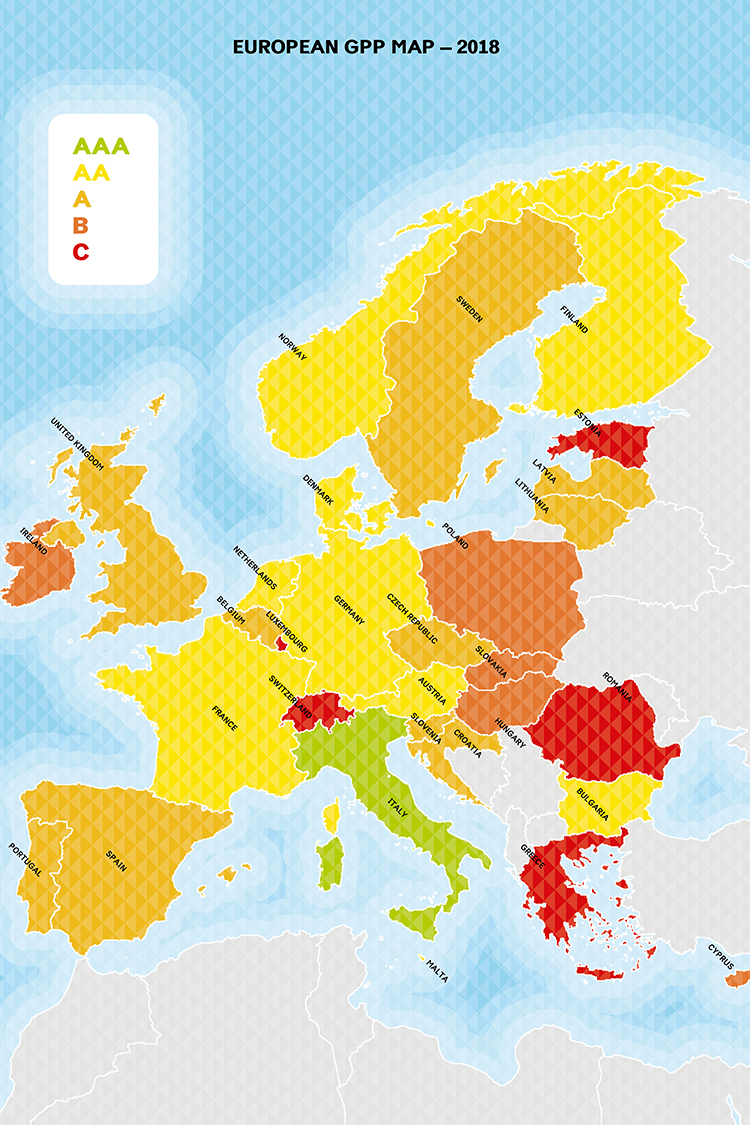To date, Italy is still Europe’s only country where Green Public Procurement (GPP) is compulsory: the boot-shaped country is a GPP textbook case.
For over two years, all public procurements have had to include minimum environmental criteria enacted by the Ministry of the Environment. Europe is watching closely and in admiration. EU countries are certainly taking steps forward towards GPP implementation, but they are lagging behind compared to Italy; it is still the first (and only) country to have made it compulsory throughout the entire nation, for all public administrations and for the entire tender, regardless of whether it may concern over or under budget public sector purchases.
Important progress has also been made elsewhere and finally some countries are upping their game.
In Germany, as of January 18th 2017, federal offices have had to choose products using energy on the basis of an accurate analysis of their lifecycle costs and must pay particular attention to eco-labels. Some countries have introduced limited requirements, in that it involves only some public administrations (for instance in Holland the central government must enact the numerous – 45 – national environmental criteria), or only some mandatory cireteria (usually starting with energy, such as in Bulgaria, Denmark and Finland).
Many other countries are updating their national Plans and Strategies, including Italy.
There is also another important aspect where some countries have shown progress over the last couple of years: monitoring. Even when GPP’s voluntary measures are present, whose application local authorities “suggest,” some states have still introduced specific measures to monitor and assess their application, because they think that benefits and awareness of GPP advantages and their results should be disseminated.
For instance, in Spain regular measurements are carried out and in their most recent application revealed astonishing data for Barcelona: 96% of purchases made so far are in line with environmental criteria and moreover a decree for compulsory implementation of GPP is being enacted. In France, mandatory annual measurements are reinforced by a system of economic incentives and penalties. In Malta, even though GPP is not compulsory in any way, for every Ministry there is a person responsible for ensuring that all enacted procedures comply with GPP environmental criteria. Rather than a legal approach, these are signs of a more practical and operational strategy.
The supervision aspect is paramount for a real implementation of the environmental criteria in contracts. Without an effective monitoring system, it is not possible to ascertain whether rules and regulations are correctly applied in a specific and widespread way and to measure the results achieved. More importantly, without proper monitoring we cannot convince stragglers that we are talking about actual legal compliance, with important consequences in terms of invalidating the call for tender and the allocated contracts in case of non-compliance.

GPP Doesn’t Exist if it Cannot Be Inspected and Measured
It is no coincidence that along with monitoring, another crucial aspect is the inspection system: public administrations must be able to recognise environmental criteria in procurements, so that everything can work properly. Including environmental criteria with no clear and unambiguous tools to ascertain their presence when the contract is awarded, can be very problematic, discouraging and contribute to a dysfunctional system.
For these very reasons, along with an update on the level of implementation of GPP regulations within European States (see Renewable Matter, issue 11, July-August 2016, p. 60), on the basis of three indicators (presence of a strategy or a national plan on GPP, enacted environmental criteria, and level of requirement), we collected information on the adopted monitoring systems, both embodied in the contracts regulations and systems and periodic and occasional inspections.
As for monitoring, Italy is gearing up: indeed, the implementation of the agreement signed on 19th March 2018 between the Ministry of the Environment and National Anti-Corruption Authority (ANAC), with important functions in this sphere by the Contracts Code (art. 213, Dlgs. 50/2016) is forthcoming.
Meanwhile, in 2018 the results of a first investigation carried out by Legambiente (the Italian NGO that focuses on environmental issues) have been made public in partnership with Fondazione Ecosistemi (the Italian organisation specialised in GPP), on a sample of 1,048 Italian administrations (among the “most-recycling municipalities”), regarding the implementation of minimum environmental criteria in public procurements in Italy in 11 sectors, where it is shown that at least 30% do not implement them.
After having a closer look at each sector individually, some data seems alarming: only 5.82% of the interviewed municipalities claim to implement minimum environmental criteria all the time (CAM) in the construction sector (which has been in place in its updated version since October 2017); 6.10% claim to implement the criteria on interior furniture; 9.92% on urban furniture; and 9.54% on electric and electronic appliances.
The situation for other investigated sectors is slightly comforting, although still disappointing: waste management, paper, heating and lighting, cleaning and collective catering, where results are still very low (see figure).
In short, Italy is way ahead with regulations, but not so much in terms of their implementation.

Complete table on Renewable Matter: www.renewablematter.eu/en/the-magazine


